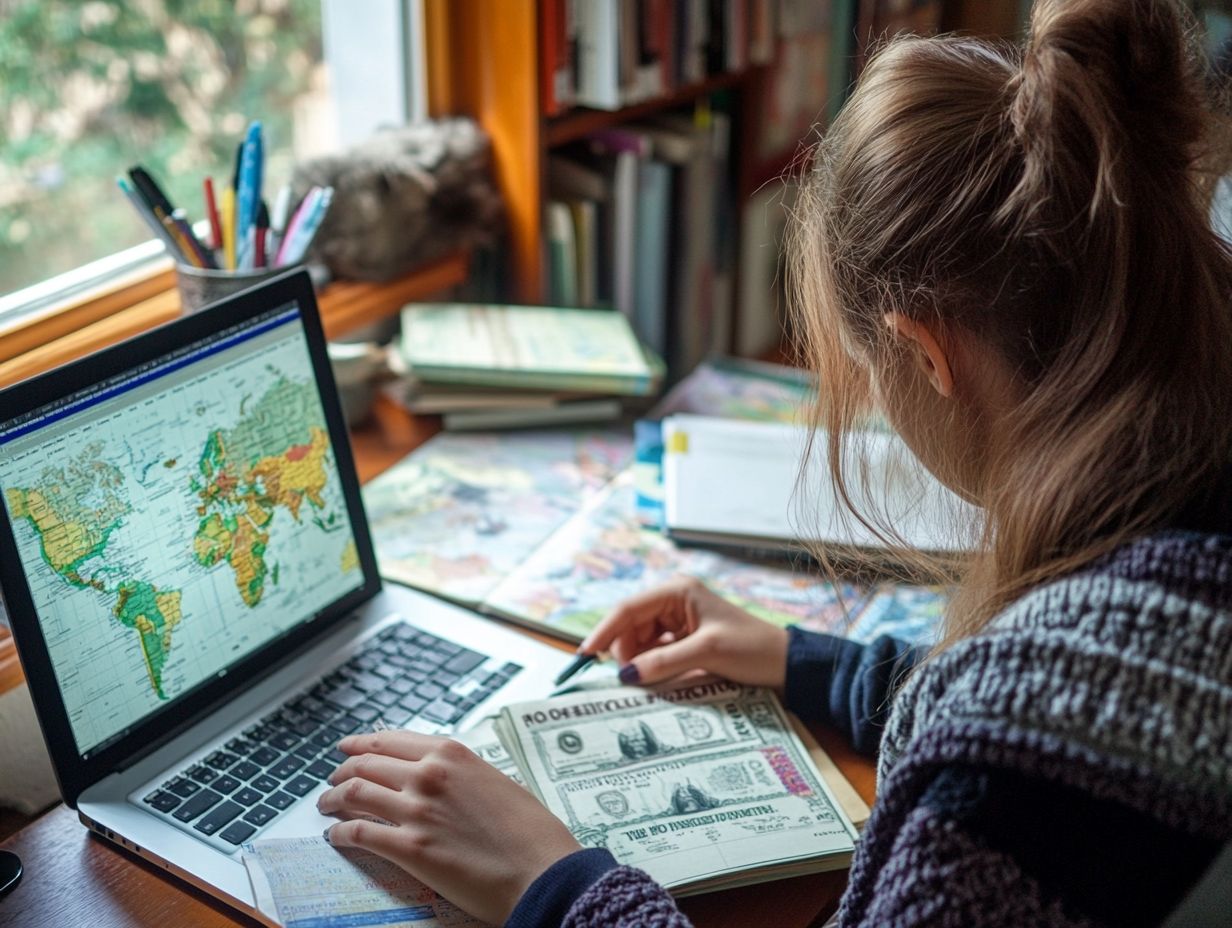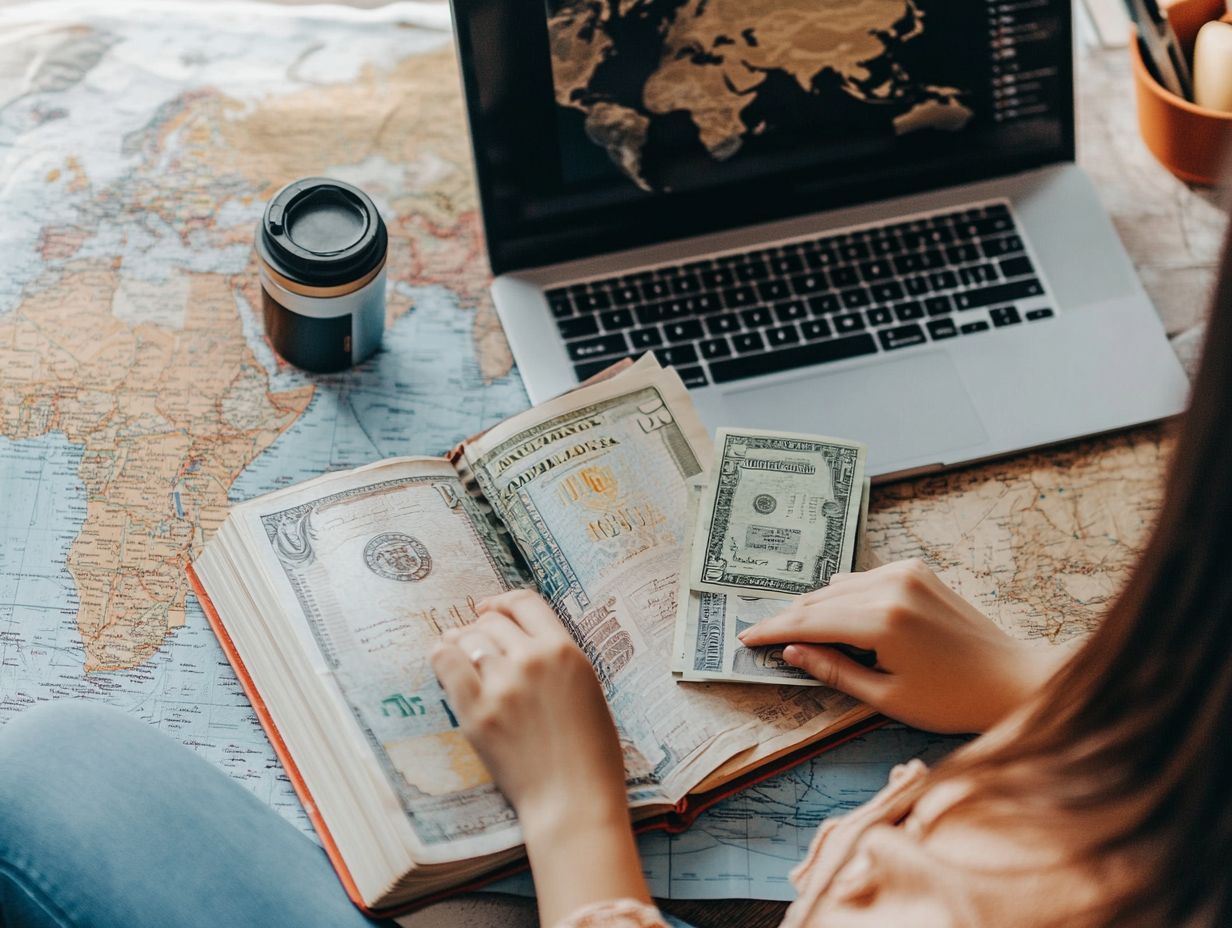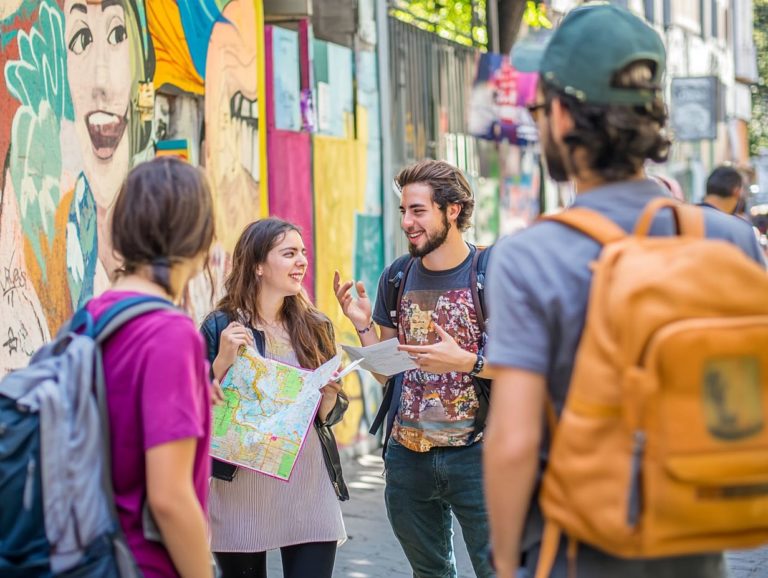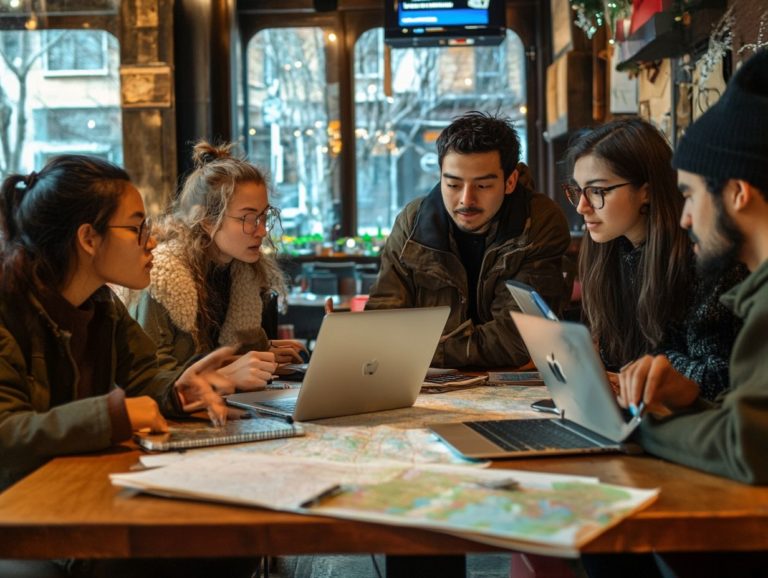Understanding Local Currency: A Student’s Guide
Navigating local currency can truly be a game-changer for you, whether you’re studying abroad or traveling. This guide breaks down everything you need to know, from the benefits of using local currency to practical tips for managing your finances on the go. You’ll discover how exchange rates work, the various factors that influence them, and strategies for securing the best rates. Get ready to maximize your spending power while exploring new and exciting places!
Contents
- Key Takeaways:
- Benefits of Using Local Currency
- Understanding Exchange Rates
- Using Local Currency While Traveling
- Managing Local Currency as a Student
- Frequently Asked Questions
- What is local currency?
- Why is it important for students to understand local currency?
- How can I exchange my home currency for local currency?
- What are the benefits of using local currency instead of foreign currency?
- What should I do with leftover local currency when leaving a country?
- Is it necessary to carry cash in local currency or can I use my credit/debit card?
Key Takeaways:

- Local currency offers convenience and cost savings for students while traveling, making it the preferred option for transactions.
- Understanding exchange rates and their fluctuation is crucial for making informed decisions when dealing with local currency.
- To manage local currency as a student, budgeting, tracking expenses, and being mindful of currency conversion fees are essential strategies.
What is Local Currency?
Local currency is the money you use within a specific geographical area or country, typically overseen by central authorities like the Federal Reserve for U.S. currency. It includes everything from coins and banknotes to modern digital currencies, all of which help you with your daily purchases. Understanding local currency is essential, whether you re an international student or a local one, particularly when navigating currency exchange and its implications for money management and economic literacy.
You ll find exciting local currencies like community currencies or local exchange trading systems, designed to encourage spending right where you are and bolster local economies. Take the Bristol Pound, for instance, a local currency in the UK that enables residents to shop locally while supporting their community’s businesses.
In contrast, global currencies like the euro or yen operate on a much larger scale, influenced by fluctuating exchange rates that can significantly impact local economies.
The Federal Reserve plays a crucial role in regulating U.S. currency, working to maintain stability against larger global forces like inflation and monetary policy. These factors can profoundly affect both local and foreign exchange markets, emphasizing the importance of staying informed.
Benefits of Using Local Currency
Utilizing local currency presents a multitude of advantages that significantly elevate the experiences of both students and travelers. From the convenience of transactions to the potential for cost savings, this approach fosters a deeper understanding of economic literacy and money management principles.
When you transact in local currency, you can sidestep the unnecessary bank fees that frequently accompany foreign currency exchanges. This practice also helps you gain valuable insights into local economic conditions, thereby enriching your social studies curriculum in a meaningful way.
Convenience and Cost Savings
One of the primary advantages of using local currency is the convenience it brings to your daily transactions. This is especially beneficial if you re a student managing finances with credit and debit cards linked to your local accounts, as it makes budgeting and expense tracking a breeze.
When you make purchases in the local currency, you eliminate the hassle and unpredictability of fluctuating exchange rates. This gives you a clearer picture of your expenditures. This approach not only reduces those pesky foreign transaction fees that can pile up without warning but also provides you with a sense of financial control, so you can see exactly how much you are spending.
Adapting to local monetary practices can truly elevate your shopping experience. It enables you to tap into localized offers and promotions. Whether you re traveling, studying abroad, or simply engaging in local commerce, using the local currency reflects a genuine respect and understanding for the local economy, ultimately making all your financial interactions smoother and more enjoyable.
Understanding Exchange Rates
Understanding exchange rates is crucial for anyone involved in currency exchange. It directly impacts the value of the U.S. dollar against foreign currencies and shapes your economic literacy. This knowledge empowers students to tackle global finance confidently.
This knowledge is particularly valuable for students diving into social studies and economics. It gives them the tools to navigate the complexities of global finance with confidence.
Factors Affecting Exchange Rates

Several key factors influence exchange rates, including:
- Economic indicators (like GDP growth and employment rates)
- Interest rates
- Inflation
- Geopolitical stability
Each of these elements can significantly affect the value of the U.S. currency in global markets.
Economic indicators act as vital barometers for currency strength. When the economy performs robustly, it often leads to a stronger currency. For example, if unemployment rates decrease, confidence in the economy typically increases. This can drive up demand for the U.S. dollar.
Interest rates set by central banks also play a significant role. Higher rates tend to attract foreign capital, boosting the currency’s value.
On the flip side, inflation erodes purchasing power and diminishes a currency’s appeal. Geopolitical stability or the lack thereof can cause rapid fluctuations in exchange rates. Events such as conflicts or government instability often prompt investors to seek safer havens, leading to a stronger dollar in times of uncertainty.
Calculating Exchange Rates
Calculating exchange rates can involve a variety of methods, from straightforward direct conversions to intricate calculations that factor in market fluctuations and currency exchange fees. Mastering these calculations is essential for improving your economic literacy.
By mastering these calculations, you can navigate your finances more effectively when traveling abroad or engaging in international trade. For instance, using online tools like XE.com or OANDA allows you to monitor real-time exchange rates and see how they fluctuate with economic changes.
Understanding concepts like forward and spot rates gives you valuable insight into future currency trends. This knowledge helps you make smarter budgeting decisions. Whether you re saving for your dream trip or considering investments in foreign markets, being skilled at calculating exchange rates can significantly influence your overall financial well-being.
Using Local Currency While Traveling
When you use local currency while traveling, you not only save money but also immerse yourself in local culture. This approach elevates your experience and facilitates effective budgeting and money management.
By leveraging your credit and debit cards for transactions, you ensure that you receive the best value for your money.
Tips for Finding the Best Exchange Rates
Finding the best exchange rates demands a sharp eye for market trends and familiarity with various financial institutions. Being able to keep track of your financial records enhances your economic literacy and helps you manage your money effectively while traveling.
To truly get the most value, consider using smartphone apps designed to compare live exchange rates in real-time. Imagine, you re a savvy student who discovers through one of these apps that exchanging currency just before your trip offers a far better rate than waiting until you hit the airport.
Being mindful of market trends is also key. You might find that exchanging money mid-week often yields better rates than on weekends, when banks may impose higher fees. Understanding the fine print regarding transaction fees especially those tied to certain ATMs ensures that every dollar stretches further. This allows you to indulge in more enriching experiences during your travels.
Have you ever wondered how you can get the best bang for your buck while traveling? Don t miss out on better rates before your trip!
Using Credit Cards and ATMs
Using credit cards and ATMs while traveling abroad offers a blend of convenience and flexibility. However, it s crucial for you to understand the bank fees involved and how they could impact your local currency transactions and overall budget.
Navigating unfamiliar territories often demands quick decisions about payment methods. Being well-informed can save you both time and money.
When pondering whether to use credit cards or cash, you may discover that credit cards frequently come with rewards or purchase protections that cash simply cannot match. However, be wary of the hidden fees that can arise, particularly with international transactions.
For your travels, seek out credit cards that boast no foreign transaction fees and consider withdrawing local currency via ATMs to sidestep those pesky extra bank charges. Balancing these factors can significantly enhance your travel experience. Remember to weigh the convenience of carrying cash against the added security of credit cards.
By planning ahead and comparing your options, you can dodge unnecessary expenses and make the most of your exciting travel adventures.
Managing Local Currency as a Student

Effectively managing local currency as a student is essential for maintaining financial stability and fostering economic literacy. This process requires you to engage in meticulous budgeting and keep track of your expenses, while also grasping the nuances of currency exchange in various contexts.
Taking these steps not only enables you to make informed financial decisions but also equips you with valuable skills for your future endeavors. Act now to start mastering your finances and avoid costly mistakes!
Budgeting and Tracking Expenses
Budgeting and tracking expenses are essential skills for you to master. They create a strong foundation for effective money management and greater economic literacy. This knowledge helps you make smart choices with your money!
These skills help you allocate your limited resources wisely, ensuring you can meet both your daily needs and long-term aspirations. By utilizing practical tools like mobile budgeting apps or spreadsheets, you can monitor your spending habits in real time.
For example, if you’re aiming to save for a study abroad program, you can set specific monthly savings goals and track your progress along the way.
Implementing strategies like the 50/30/20 rule where 50% of your income goes to needs, 30% to wants, and 20% to savings can make the process both manageable and rewarding. Recognizing the importance of setting financial targets will significantly enhance your engagement with your financial journey.
Dealing with Currency Conversion Fees
Dealing with currency conversion fees costs that occur when changing one currency into another is a crucial yet often overlooked aspect of managing your finances abroad. This is particularly important for students who may not fully grasp how these hidden costs can impact their overall budget and spending power.
These fees usually pop up when you exchange your home currency for the local currency, whether you’re using ATMs, banks, or currency exchange services. Financial institutions often implement fees as a percentage of the transaction amount or tack on a markup to the exchange rate, resulting in additional expenses that can add up quickly.
To keep these costs at bay, it s vital to conduct thorough research. For example, opting for a credit card that offers no foreign transaction fees can be a savvy choice. Pre-paying for travel expenses or accommodation can also help. You might find it beneficial to exchange money at local bank branches instead of airports, where rates are generally less favorable.
By employing these practical strategies, you can significantly reduce currency conversion fees and make the most of your travel budget.
Frequently Asked Questions
What is local currency?
Local currency refers to the official currency used in a specific country or region. It is the money that is accepted and used for transactions within that particular area.
Why is it important for students to understand local currency?

Understanding local currency is crucial for students studying abroad or traveling. It helps you manage your finances and prevents overspending, but it’s also important to embrace local culture. For more insights, check out understanding local customs: a student’s guide.
How can I exchange my home currency for local currency?
You can exchange your home currency at banks, exchange offices, or ATMs. Check exchange rates to get the best deal.
What are the benefits of using local currency instead of foreign currency?
Using local currency saves you money by avoiding extra conversion fees. It also supports the local economy and enhances your cultural experience.
What should I do with leftover local currency when leaving a country?
You can exchange it back to your home currency or keep it as a souvenir. Remember to check with customs, as some countries limit how much local currency you can take out.
Is it necessary to carry cash in local currency or can I use my credit/debit card?
Having cash on hand is smart for small purchases and emergencies! Most places in popular tourist areas accept credit or debit cards, too.





